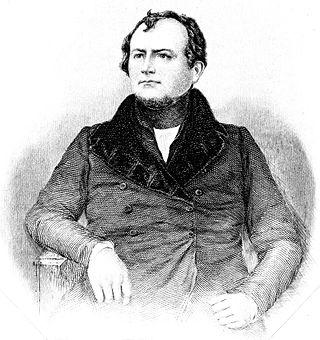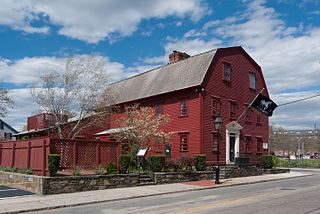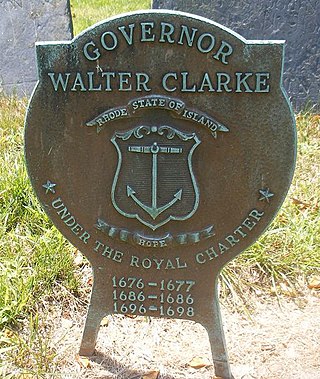
Rhode Island is a state in the New England region of the Northeastern United States. It is the smallest U.S. state by area and the seventh-least populous, with slightly fewer than 1.1 million residents as of 2020; but Rhode Island has grown at every decennial count since 1790 and is the second-most densely populated state, after New Jersey. The state takes its name from the eponymous island, though nearly all its land area is on the mainland. Rhode Island borders Connecticut to its west; Massachusetts to its north and east; and the Atlantic Ocean to its south via Rhode Island Sound and Block Island Sound; and shares a small maritime border with New York, east of Long Island. Providence is its capital and most populous city.

The Dorr Rebellion (1841–1842) was an attempt by disenfranchised residents to force broader democracy in the U.S. state of Rhode Island, where a small rural elite was in control of government. It was led by Thomas Wilson Dorr, who mobilized the disenfranchised to demand changes to the state's electoral rules. The state was still using its 1663 colonial charter as a constitution; it required that voters own land as qualification to vote. The rebellion established a parallel government alongside the existing chartered government and wrote a new constitution for Rhode Island. Although the rebellion was crushed militarily, it forced the rewriting of the state constitution to expand eligibility to vote.

The Massachusetts General Court, formally the General Court of Massachusetts, is the state legislature of the Commonwealth of Massachusetts located in the state capital of Boston. The name "General Court" is a holdover from the earliest days of the Massachusetts Bay Colony, when the colonial assembly, in addition to making laws, sat as a judicial court of appeals. Before the adoption of the state constitution in 1780, it was called the Great and General Court, but the official title was shortened by John Adams, author of the state constitution. It is a bicameral body. The upper house is the Massachusetts Senate which is composed of 40 members. The lower body, the Massachusetts House of Representatives, has 160 members; until 1978, the state house had 240 members. It meets in the Massachusetts State House on Beacon Hill in Boston.

The Colony of Rhode Island and Providence Plantations was one of the original Thirteen Colonies established on the east coast of America, bordering the Atlantic Ocean. It was founded by Roger Williams. It was an English colony from 1636 until 1707, and then a colony of Great Britain until the American Revolution in 1776, when it became the State of Rhode Island and Providence Plantations.

The Province of Massachusetts Bay was a colony in New England which became one of the thirteen original states of the United States. It was chartered on October 7, 1691, by William III and Mary II, the joint monarchs of the kingdoms of England, Scotland, and Ireland, and was based in the merging of several earlier British colonies in New England. The charter took effect on May 14, 1692, and included the Massachusetts Bay Colony, the Plymouth Colony, the Province of Maine, Martha's Vineyard, Nantucket, Nova Scotia, and New Brunswick; the Commonwealth of Massachusetts is the direct successor. Maine has been a separate state since 1820, and Nova Scotia and New Brunswick are now Canadian provinces, having been part of the colony only until 1697.

Thomas Wilson Dorr, was an American politician and reformer in Rhode Island, best known for leading the Dorr Rebellion.

The Constitution of the State of Connecticut is the basic governing document of the U.S. state of Connecticut. It was approved by referendum on December 14, 1965, and proclaimed by the governor as adopted on December 30. It comprises 14 articles and has been amended 31 times.
Charter colony is one of three classes of colonial government established in the 17th century English colonies in North America, the other classes being proprietary colony and royal colony. These colonies were operated under a corporate charter given by the crown. The colonies of Virginia, Rhode Island, Connecticut, and Massachusetts Bay were at one time or another charter colonies. The crown might revoke a charter and convert the colony into a crown colony. In a charter colony, Britain granted a charter to the colonial government establishing the rules under which the colony was to be governed. The charters of Rhode Island and Connecticut granted the colonists significantly more political liberty than other colonies. Rhode Island and Connecticut continued to use their colonial charters as their State constitutions after the American Revolution.

The history of Rhode Island is an overview of the Colony of Rhode Island and Providence Plantations and the state of Rhode Island from pre-colonial times to the present.
The Law and Order Party of Rhode Island was a short-lived political party in the U.S. state of Rhode Island in the 1840s, brought into existence as a consequence of the Dorr Rebellion.
Originally, the state of New Jersey was a single British colony, the Province of New Jersey. After the English Civil War, Charles II assigned New Jersey as a proprietary colony to be held jointly by Sir George Carteret and John Berkeley, 1st Baron Berkeley of Stratton. Eventually, the collection of land fees, or quit-rents, from colonists proved inadequate for colonial profitability. Sir George Carteret sold his share of the colony to the Quakers in 1673. Following the sale, the land was divided into East and West Jersey. In 1681, West Jersey adopted a constitution. In 1683, East Jersey adopted one as well. In 1702, the colonies were united again under Anne, Queen of Great Britain, and adopted a constitution in 1776.
Connecticut is known as "The Constitution State". The origin of this title is uncertain, but the nickname is assumed to be a reference to the Fundamental Orders of 1638–39 which represent the framework for the first formal government written by a representative body in Connecticut. Connecticut's government has operated under the direction of five separate documents in its history. The Connecticut Colony at Hartford was governed by the Fundamental Orders, and the Quinnipiac Colony at New Haven had its own Constitution in The Fundamental Agreement of the New Haven Colony which was signed on June 4, 1639.

The Constitution of the State of Rhode Island is a document describing the structure and function of the government of the U.S. State of Rhode Island.

The Old Colony House, also known as Old State House or Newport Colony House, is located at the east end of Washington Square in the city of Newport, Rhode Island, United States. It is a brick Georgian-style building completed in 1741, and was the meeting place for the colonial legislature. From independence in 1776 to the early 20th century, the state legislature alternated its sessions between here and the Rhode Island State House in Providence.
Since the Great Depression, Rhode Island politics have been dominated by the Rhode Island Democratic Party, and the state is considered part of the Democrats' "Blue Wall." Democrats have won all but four presidential elections since 1928, with the exceptions being 1952, 1956, 1972, and 1984. The Rhode Island Republican Party, although virtually non-existent in the Rhode Island General Assembly, has remained competitive in gubernatorial elections, having won one as recently as 2006. Until 2014, Democrats did not win a gubernatorial election in the state since 1992, and it was not until 2018 that they won one by double digits. The Rhode Island General Assembly has continuously been under Democratic control since 1959.

The following outline is provided as an overview and topical guide to the U.S. State of Rhode Island:

Walter Clarke (1640–1714) was an early governor of the Colony of Rhode Island and Providence Plantations and the first native-born governor of the colony. The son of colonial President Jeremy Clarke, he was a Quaker like his father. His mother was Frances (Latham) Clarke, who is often called "the Mother of Governors." While in his late 20s, he was elected as a deputy from Newport, and in 1673 was elected to his first of three consecutive terms as assistant. During King Philip's War, he was elected to his first term as governor of the colony. He served for one year in this role, dealing with the devastation of the war, and with the predatory demands of neighboring colonies on Rhode Island territory during the aftermath of the war.

The Rhode Island Royal Charter provided royal recognition to the Colony of Rhode Island and Providence Plantations, approved by England's King Charles II in July 1663. It outlined many freedoms for the inhabitants of Rhode Island and was the guiding document of the colony's government over a period of 180 years.
Joseph Sheffield (1661–1706) was an inhabitant of Portsmouth in the Colony of Rhode Island and Providence Plantations during the last half of the 17th century. He held a number of important offices within the colony, including Deputy, Assistant and Attorney General. He is most noted for being selected as Rhode Island's agent to England on two occasions, but never appears to have served in that role due to the indecision of the General Assembly. He played a prominent role in the affairs of the colony during an extremely turbulent time, when Rhode Island was threatened with losing its charter due to "irregularities" perceived by the English Board of Trade. Sheffield died at the age of 44, leaving a widow and several minor children.
Alfred Niger was a free Black activist who lived in Providence, Rhode Island and worked as a barber. Niger was a leading influential figure in the movement for Black suffrage in early 19th century Rhode Island, during the onset of the Dorr Rebellion.














